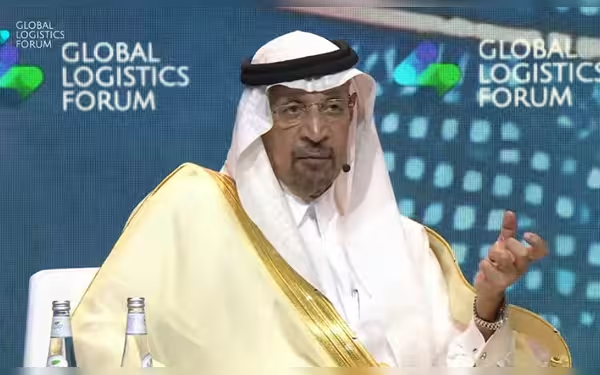Saturday, November 16, 2024 05:39 PM
Saudi Arabia's Airport Privatization Initiative to Boost Logistics Sector
- Saudi Arabia to privatize management of four airports.
- Focus on enhancing logistics and transport sector.
- Commitment to sustainability and green energy sources.
 Image Credits: arabnewspk
Image Credits: arabnewspkSaudi Arabia plans to privatize four airports, enhancing its logistics sector and focusing on sustainability and technology.
Saudi Arabia is making significant strides in enhancing its logistics and transport sector, a move that is expected to reshape the Kingdom's economic landscape. Recently, at the Global Logistics Forum held in Riyadh, Saudi Investment Minister Khalid Al-Falih announced plans to appoint private operators to manage four airports in the Kingdom. This initiative is part of a broader strategy to empower private entities and reduce direct government involvement in business operations.
The Kingdom's National Logistics Strategy aims to increase the sector's contribution to the gross domestic product from 6 percent to 10 percent by the year 2030. Al-Falih emphasized the importance of establishing Saudi Arabia as a strategic regional hub and logistics gateway that connects three continents. He stated, "The government is moving away from direct business involvement. Empowering and enabling the private sector is essential." This shift is already evident, as the Madinah airport, recognized as the most efficient in the Kingdom, is currently managed by a private operator under a long-term concession.
In addition to airport management, the Kingdom is also focusing on enhancing its seaports. Al-Falih pointed out that King Abdullah Port, which was built without any government capital expenditure, is another example of successful private operation. He remarked, "In the coming months and years, you will see continued privatization, with four airports entering the market. This is just the beginning." This privatization effort is expected to attract significant investments, particularly in logistics and transport.
In August, Saudi Arabia approved an updated investment law designed to enhance foreign direct investment. This law includes stronger protections for investors, ensuring adherence to the rule of law, fair treatment, property rights, and robust intellectual property safeguards. Al-Falih highlighted the importance of creating a regionalized supply chain within the Gulf Cooperation Council, stating, "What is essential for us in the region is the regionalization of global supply chains." He believes that the Middle East is well-positioned to develop its logistics and transport sector, given its strategic geographical location.
Al-Falih also addressed the need for sustainability in the logistics sector. He described the Kingdom's commitment to developing green energy sources, such as green hydrogen and green ammonia, to reduce emissions. "It is not easy to switch to alternative fuels. But that we must do. From a climate standpoint, and given everybody’s commitment to net zero in the next few decades," he said. This perspective reflects a growing awareness of environmental issues and the need for sustainable practices in the transport sector.
Concerns about pollution from expanding shipping lines were echoed by UAE Minister of Energy and Infrastructure Suhail Al-Mazrouei, who emphasized the need for alternative connectivity solutions. He stated, "The challenges ahead are significant. We cannot simply expand shipping lines or increase the number of ships, as pollution will become a major issue." This highlights the delicate balance between growth and environmental responsibility that many countries face today.
Oman’s Minister of Transport, Communications, and Information Technology, Saeed bin Hamoud Al-Maawali, also spoke about the opportunities in renewable energy, particularly in green initiatives. He noted that Oman is well-positioned to benefit from these developments, which could further enhance the region's logistics capabilities.
Technology is another crucial factor in modernizing the transport and logistics sector. Al-Falih pointed out that e-commerce platforms like Amazon have leveraged technology to become global leaders. He stated, "The trend is digitalization, data processing and AI (artificial intelligence), and they are huge enablers." This indicates a shift towards more efficient and tech-driven logistics solutions.
Saudi Arabia's commitment to privatizing its airport management and enhancing its logistics sector is a significant step towards becoming a global logistics hub. With a focus on sustainability, technology, and private sector empowerment, the Kingdom is poised to make substantial progress in the coming years. As these initiatives unfold, they will not only transform the local economy but also position Saudi Arabia as a key player in the global logistics landscape. The future looks promising, and it will be interesting to see how these developments unfold in the months and years ahead.













